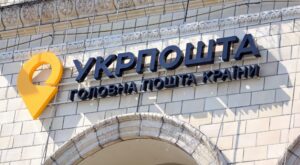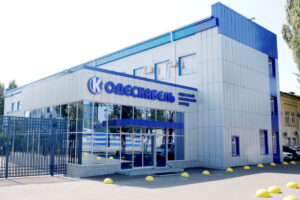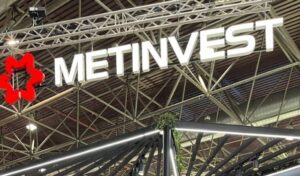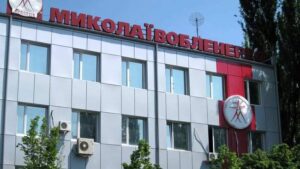
The national postal operator Ukrposhta incurred a net loss of UAH 151.8 million in the third quarter of 2025, which is 10.4% more than in the third quarter of 2024, while it was planned to reduce the loss to UAH 56.2 million, according to the quarterly report.
According to the report, Ukrposhta’s revenue in July-September decreased by 6.2% compared to the third quarter of 2024, to UAH 3 billion 18.1 million, which is 18% less than planned, while EBITDA for the reporting period amounted to UAH 100.4 million against UAH 298.6 million in the same period of 2024.
The company emphasized that the main reasons for the deviations are the actual dollar exchange rate in the third quarter of 2025 being lower than the dollar exchange rate set in the state budget for 2025, on the basis of which the planned revenues for 2025 were formed, the loss of markets and company assets due to Russia’s continued aggression, and stagnant domestic demand for services, primarily for parcels and utility payments, due to the unfavorable economic situation.
Other reasons for the deterioration in financial results include delays in the introduction of additional services for customers, the transition of pensioners to the banking system, the further digitization of payments and population decline, as well as the postponement of real estate sales from the third quarter of 2025 to the fourth quarter.
It is noted that in the third quarter of 2025, Ukrposhta accepted 19.6 million domestic and international letters (20.6 million in the third quarter of 2024), 10.2 million parcels (11.3 million), and 20.8 million payments (21.7 million).
According to the report, Ukrposhta currently has 5,100 stationary points serving 11,100 service points and 2,000 mobile points serving 20,100 service points.
The average number of full-time employees in the third quarter of 2025 was 27,100 (30,200 a year earlier), and the average salary was UAH 18,500 (UAH 17,100).
Separately, information was added that a plan of measures to improve the financial situation was developed at the meeting of the supervisory board. In particular, this involves maintaining a delivery quality level of at least 95%, improving the customer experience, further integration with key customers and marketplaces to increase shipment volumes, and launching the first agency parcel delivery points and parcel terminals to improve pedestrian accessibility.
As for payments, the front-end system is being updated and a transition to a new payment system is underway, with revised payment rates to increase revenue. A decision has also been made to sell real estate that is not used in operational activities, and a gradual optimization of personnel is taking place in line with the reduced volume of traditional services (from 28,800 employees in January 2025 to 27,100 employees in September) and a deferred review of salaries for production personnel due to failure to meet financial targets.
Ukrposhta added that it plans to expand the functionality of its new mobile app for customers in the fourth quarter of 2025, where parcels, payments, and other services will now be automatically loaded. Preparations are also underway for winter, including a review of processes and routes, and the purchase of additional lights, power banks, and pallets.
According to the report, the outstanding portion of the EBRD debt amounted to UAH 1 billion 325.9 million at the end of the third quarter, with a maturity date of June 20, 2032.
As reported, in the first half of 2025, Ukrposhta increased its revenue by 5.4% compared to the same period last year, to UAH 6.505 billion, reducing its net loss by 27.2% to UAH 311.8 million.

JSC Dnipro Switch Factory (DnSZ, Dnipro), a major Ukrainian manufacturer of switches for main railway tracks, increased its net profit by 69.6% in January-September 2025 compared to the same period in 2024, to UAH 503.16 million.
According to the financial results report on the company’s website, net sales revenue for this period decreased by 2.7% to UAH 1 billion 542.5 million.
DnSZ received UAH 625.3 million in profit from operating activities (50% more), and gross profit amounted to UAH 657.1 million (+8.2%).
As reported, in the first half of 2025, the plant increased its net profit by 2.2 times compared to the same period in 2024, to UAH 249.2 million, with revenue growing by 24.2% to UAH 796.7 million.
Thus, in the third quarter of 2025, DnSZ increased its net profit by 39.3% compared to July-September 2024, to UAH 254 million, while net income decreased by 21%, to UAH 745.8 million.
Founded in 1916, Dnipro Railway Switch Plant currently manufactures various types of railway switches for mainline and industrial transport, subways, as well as track superstructure elements. It has a full production cycle, including its own design bureau.
The plant ended 2024 with a consolidated net profit of UAH 540.41 million, which is 6% more than in 2023, of which 78% (UAH 420 million) was allocated to dividend payments. Consolidated revenue grew by 77% to UAH 1.79 billion.
According to the company’s report on its website, unconsolidated net profit increased by 6.7% to UAH 544.22 million, with revenue growing by 31.1% to UAH 2.346 billion.
The share of exports in 2024 was 5.6%. Products were shipped to Georgia, Azerbaijan, Moldova, Bulgaria, Germany, and the Baltic states.

In July-September of this year, the large Ukrainian cable plant Odeskabel received net sales revenue of UAH 734.4 million, which is 10% more than in the third quarter of last year.
According to the description of economic activity in the company’s interim report, during this period it produced 2,103 tons of copper cable and wire products worth UAH 696.4 million, compared to 1,531 tons worth UAH 578.2 million in the third quarter of last year.
Average selling prices for cable products for the reporting period of 2025, as in 2024, ranged from UAH 600,000 to UAH 1.5 million/km, depending on the brand size.
In July-September 2025, products worth UAH 171.9 million were exported, which is 23.3% of sales, while last year during this period, exports amounted to UAH 148.7 million (22.3%).
As in the previous year, the plant used 70-80% of its equipment during the reporting period.
The report does not contain data on financial results for January-September 2025 or 2024.
As reported, in the first quarter of this year, the plant increased its net income by 70.2% compared to the same period in 2024, to UAH 738 million, and in the second quarter, by 33.5% compared to the same period last year, to UAH 737.4 million.
PJSC “Odeskabel” produces a wide range of communication, radio frequency, digital, and LAN cables, with the widest range of products on the Eastern European market. It also produces power and heating cables, wires, and cords.
In Ukraine, the company’s products are used by telecommunications operators and energy networks, among others.
As of October 1, 2025, the plant employed nearly 820 people.

The aviation industry enterprise FED (Kharkiv) ended January-September 2025 with a net profit of UAH 176 million, which is 25.4% more than in the same period of 2024.
According to the company’s interim financial statements published in the NSSMC’s information disclosure system, its net income for this period increased by 32% to UAH 774.9 million.
FED received UAH 218.7 million in profit from operating activities, which is 17.3% more than last year, while gross profit increased by 30% to UAH 247.6 million.
As reported, in the first half of this year, FED JSC increased its net profit almost threefold compared to the same period in 2024, to UAH 158.2 million, with net income more than doubling to UAH 601.6 million.
Thus, in the third quarter of 2025, the company reduced its net profit by 4.8 times compared to July-September 2024, to UAH 17.8 million, while net income decreased by 42.3% to UAH 173.3 million.
FED JSC specializes in the development, production, maintenance, and repair of aviation, space, and general engineering equipment.
The average number of full-time employees as of October 1, 2025, was 953.
As reported, FED received UAH 181.4 million in net profit in 2024, which is 43% less than in 2023, of which 28% (UAH 40 million) was allocated to dividend payments. Net income decreased by 26% to UAH 831.7 million.

The mining and metallurgical group Metinvest intends to acquire a pipe plant in Romania (Tubular Products Iasi S.A., AMTP Iasi) from ArcelorMittal, which is controlled by ArcelorMittal S.A. (Luxembourg). According to a preliminary notification from the European Commission on the concentration, on October 21 of this year, the EC’s Directorate-General for Competition received a notification of the proposed concentration in accordance with the Council Regulation (EU).
It is specified that the concentration will be carried out through Metinvest’s acquisition of shares in AMTP Iasi.
After preliminary consideration, the Commission considers that the transaction may fall within the scope of the Merger Regulation. However, the final decision on this matter remains with the Commission.
The Commission invites interested third parties to submit their possible observations on the proposed concentration to the Commission.
AMTP Iasi, registered in Romania, is active in the production and supply of small welded carbon steel pipes.
Metinvest is a vertically integrated group of mining and metallurgical companies. Its enterprises are located in Ukraine, in the Donetsk, Luhansk, Zaporizhia, and Dnipropetrovsk regions, as well as in the European Union, the United Kingdom, and the United States. The main shareholders of the holding company are SCM Group (71.24%) and Smart Holding (23.76%). Metinvest Holding LLC is the management company of the Metinvest Group.

JSC “Mykolaivoblenergo” on October 30 announced a tender for compulsory insurance of motor civil liability (MTPL). As reported in the system of electronic procurement Prozorro, the expected purchase price of services – 2.317 million UAH.
Tender security is not required.
The last day to apply for participation is November 7.